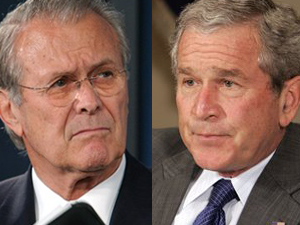 The replacement of Rumsfeld shouldn’t come as a surprise. He was under fire for almost a year, especially from veteran generals in the US about the military situation in Iraq and the running of the defence department. It is significant that he was replaced. This means he didn’t offer his resignation. He stuck to his position to the last moment when the Bush administration was faced with the reality through mid-term election results and not from polls or editorials in military press or in influential press like the Washington post which was among the first to publish the shortcomings of the US military in Iraq and armed forces who were critical of his management of the war in Iraq.
The replacement of Rumsfeld shouldn’t come as a surprise. He was under fire for almost a year, especially from veteran generals in the US about the military situation in Iraq and the running of the defence department. It is significant that he was replaced. This means he didn’t offer his resignation. He stuck to his position to the last moment when the Bush administration was faced with the reality through mid-term election results and not from polls or editorials in military press or in influential press like the Washington post which was among the first to publish the shortcomings of the US military in Iraq and armed forces who were critical of his management of the war in Iraq. The resignation of Rumsfeld is likely to create a shake-up in the defence department. But his departure is unlikely to create a major new approach to the situation in Iraq. His shadow will stay in the defence department as a new defence secretary doesn't mean the early return of US forces from Iraq. The situation in Iraq for Bush is equated with the US interests in the Middle East as the Bush administration is set to stay there until its job is finished. Rumsfeld should be seen just as minus one from the group of hawks of war such as Bush, Cheney and Rice who are still running the war in Iraq.
The Republicans are facing double challenge. First, how to succeed in keeping the government going smoothly without severe confrontation with the Democrats at the Congress. Second how to ensure staying in power after 2008 presidential elections.
The remaining years for Bush in office can bring surprises, now that the Republicans lost control of the Congress. The US policy may undergo a new drama. As Bush came to office in a dramatic way through the Supreme Court decision, he may end his presidency in a dramatic way. In what way? Time will tell.
 The replacement of Rumsfeld shouldn’t come as a surprise. He was under fire for almost a year, especially from veteran generals in the
The replacement of Rumsfeld shouldn’t come as a surprise. He was under fire for almost a year, especially from veteran generals in the  The replacement of Rumsfeld shouldn’t come as a surprise. He was under fire for almost a year, especially from veteran generals in the
The replacement of Rumsfeld shouldn’t come as a surprise. He was under fire for almost a year, especially from veteran generals in the 




No comments:
Post a Comment